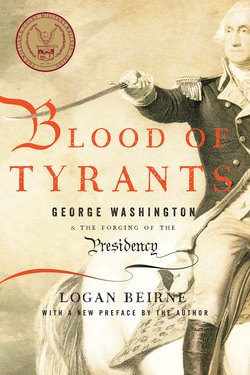Читать книгу Blood of Tyrants - Logan Beirne - Страница 21
На сайте Литреса книга снята с продажи.
Оглавление6
Supreme Law of the Land
With a vote, the delegates bestowed the full set of commander-in-chief powers on the president. But they did not elaborate on what exactly those powers were. They did not need to. When the delegates described the new presidency’s military power with the amazingly few words, “The President shall be Commander in Chief of the Army and Navy of the United States,” they were not being cagey. On the contrary, they needed no further description because it was so evident to the voters what they meant: the same powers that General Washington had exercised in the war to protect them.1
“When men spoke of the great national representative, of the guardian of the people” that the proposed president would become, “they were thinking in terms of the Father of His Country.”2 As the only American commander in chief, Washington had forged the meaning of presidential war powers in the heat of battle. He taught America “how to govern a nation at war”3 and showed firsthand that the country needed a strong commander to survive. While his military authority was sweeping, he used it virtuously. This convinced the delegates and the broader populace that the new American commander in chief, based on Washington’s precedents, could be powerful without trampling liberty.
One delegate warned, “The Executive will have great opportunitys of abusing his power; particularly in time of war when the military force, and in some respects the public money will be in his hands.”4 But Washington’s example assuaged their fears. Another delegate explained that the powers allocated to the president in the Constitution were “greater than [he] was disposed to make them,” and he believed those powers would not “have been so great had not many of the members cast their eyes towards General Washington . . . and shaped their Ideas of the Powers to be given to a President, by their opinions of his Virtue.”5
The patriots were confident in knowing that their paradigm for the new presidency’s military powers was the man who was pivotal to the birth of the United States. Washington had served as “the great protector of the Mass of the people,” and now the president would continue that role.6 Surely, lesser men would eventually occupy the office. But if they ever questioned what it meant to be the American commander in chief, the country needed only to look back to the righteous precedents that Washington had set during the Revolution. With this in mind, they finalized the Constitution.
After an entire summer of vigorous argument and difficult compromise, the great republic began with a sacrificial lamb. The lamb’s skin was soaked in water for one day and then placed in an alkaline vat of liquor and lime. Stirred at least twice daily with a long wooden pole, the lambskin sat for about a week before it was hung to dry on a stretching frame. A craftsman painstakingly scraped the skin with a blade, turning it into a fine parchment. Once prepared, it was shipped to Philadelphia, where the fledgling nation’s anxious political leaders transcribed onto it the concise words of the new Constitution.
Washington’s exalted example and unfailing perseverance had guided the delegates through long cantankerous days and nights to agree on a mere four pages of parchment that would create the new American government. In addition to naming the president as commander in chief, the Constitution outlined his nonmilitary powers, as well as the powers of Congress and the Supreme Court. On September 17, 1787, the thirty-nine exhausted delegates who had not abandoned the effort signed the parchment. Few were completely satisfied with the new Constitution. Washington certainly was not, but he conceded that it was the best they could do. He wrote, “That the Government, though not absolutely perfect, is one of the best in the world, I have little doubt.”7
After the convention, a woman asked Benjamin Franklin whether this Constitution would create a monarchy or a republic. Franklin dryly replied, “A republic, if you can keep it.” Our Founders provide guidance on how we might do so.
When the Constitution went before the states for ratification, it faced a barrage of criticism. Many believed it would be rejected. The voters feared relinquishing local power to a national government. They were suspicious of the new presidency.8 But in the end, the American people adopted the Constitution largely because of their esteem for Washington’s Revolutionary War leadership. As a delegate admitted, “Be assured, his influence carried this government.”9
That unsatisfying eighteenth-century document became the “Supreme Law of the Land” and still governs the United States to this day. The few words immortalized on that old parchment define the nation. They embody the radical ideal that every citizen has a right to “life, liberty, and the pursuit of happiness,” regardless of his or her heredity.10 Forged amidst turmoil, this document has never really escaped it. Its words not only have served as kindling for uprisings and wars but also remain at the center of contemporary debates over our nation’s soul.
America’s memory of General George Washington’s Revolutionary War powers has faded over the past two centuries. However, the Constitution has not. The Commander in Chief clause remains unaltered. The president still derives his constitutional military power from those precious few words that the Founders wrote during that hot summer of 1787. What it means to be the “American commander in chief” may be murky now, but it was not so back then. The founding generation ratified that clause with a specific person in mind. That gentleman farmer, who saved the fledgling nation, set precedents that still define those war powers necessary to defend the United States.
